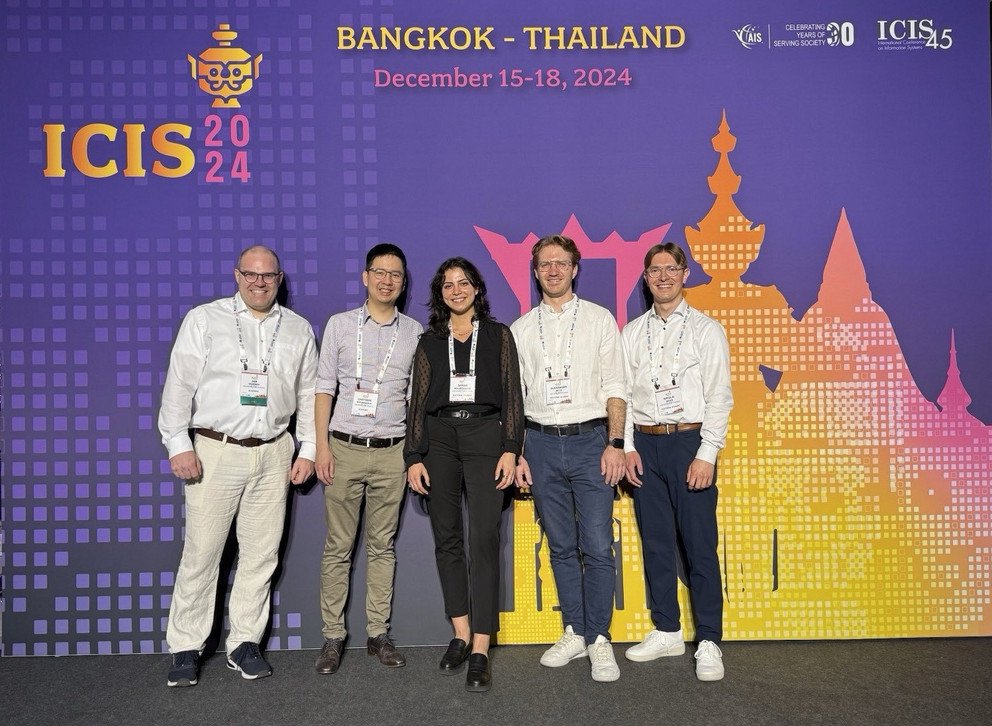The team of the Chair of Internet and Telecommunications Business presented its research at the ICIS Conference 2024 and the Workshop on Information Systems and Economics (WISE) 2024 in Bangkok, exchanged ideas with other researchers, discussed current research topics and networked with other experts.
The conference theme “Digital Platforms for Emerging Societies” aims to examine the expansive role of information technology in driving economic and societal transformation across the globe. The particular interested is in how digital platforms influence community structures, social dynamics, and global economic trends in today’s diverse settings around the globe. Information systems research plays a vital role in analyzing how digital platforms create socio-economic value, drive innovation strategies, reform governance and processes, shape user behaviors, and/or the establishment of inclusive and sustainable digital platform ecosystems in different parts of the world.https://icis2024.aisconferences.org/
The following research papers were presented at ICIS 2024:
- Ben Messaoud, S., Krämer, J., & Sachs, N. (2024). The Odd One Out: An Experimental Investigation of Avatar-Mediated Communication on Homophily and Trust. Proceedings of International Conference on Information Systems (ICIS) 2024. Bangkok, Thailand:
This paper investigates how people perceive and trust others represented as avatars in digital environments. An online experiment was conducted and showed that avatars were perceived differently and trusted less, but only in environments with heterogeneous representation. https://aisel.aisnet.org/icis2024/humtechinter/humtechinter/11/ - Krämer, J, & Sachs, N. (2024). Trusting in the Metaverse: On the Effects of Immersion and Avatar-Mediation on Trust in Virtual Work Environments. Proceedings of International Conference on Information Systems (ICIS) 2024. Bangkok, Thailand:
In a randomized controlled experiment with 152 participants we examined how Social Virtual Reality impacts trust and relationship-building compared to traditional videoconferencing. We found that Social VR does not hinder trust or the development of interpersonal relationships while enhancing co-presence and increasing anonymity. https://aisel.aisnet.org/icis2024/digtech_fow/digtech_fow/21/ - Bhargava, H. K., Krämer, J., & Wipusanawan, C. (2024). Competition and innovation by search engines in the presence of preset defaults. Proceedings of International Conference on Information Systems (ICIS) 2024. Bangkok, Thailand:
This paper presents a game-theoretic model to examine the impact of setting one product as the default on competition and innovation in digital markets with (data-driven) network effects, with the prime example being search engines. We find that default settings reduce the competitive intensity, but the impact on innovation by the firms is ambiguous. https://aisel.aisnet.org/icis2024/sharing_econ/sharing_econ/15
WISE is the premier academic research conference for the discussion of Information Systems topics through the lens of economics. It has been the leading conference for research bridging IT, digital transformation, and economics, for over 30 years. researchers are expected at WISE 2024 to bring forth cutting-edge research that studies how IT, in all its forms, addresses important business and societal questions. Modern IT-enabled phenomena have wide ranging impacts for consumers, firms, industries, and markets, making this a fascinating time to be an economics of IS researcher. https://sites.google.com/view/wiseconf2024
The following research paper was presented at WISE 2024:
- Bhargava, H. K., Krämer, J., & Wipusanawan, C. How Do Preset Defaults Impact Competition and Innovation under Network Effects?
This paper presents a game-theoretic model to examine the impact of setting one product as the default on competition and innovation in digital markets, potentially with network effects. While the default settings enhance the market power of the default firm in the short run, the effects on innovation depend on the importance of network effects and the relative strengths of the firms.











